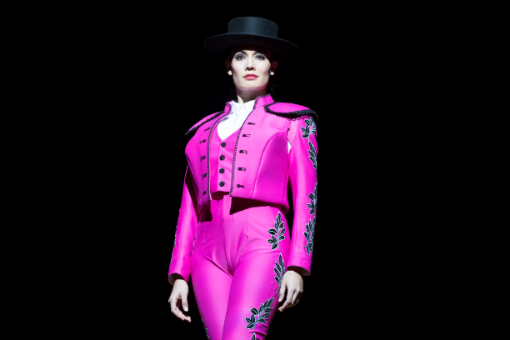 United Kingdom Bizet, Carmen: Soloists, Chorus and Orchestra of the Royal Opera House / Keri-Lynn Wilson (conductor). Royal Opera House, Covent Garden, London, 30.11.2018. (CC)
United Kingdom Bizet, Carmen: Soloists, Chorus and Orchestra of the Royal Opera House / Keri-Lynn Wilson (conductor). Royal Opera House, Covent Garden, London, 30.11.2018. (CC)

Production:
Director – Barrie Kosky
Revival director – Alan Barnes
Designer – Katrin Lea Tag
Lighting designer – Joachim Klein
Choreographer – Otto Pichler
Revival Choreographer – Madeline Ferricks-Rosevear
Dramaturg – Zsolt Horráczy
Cast:
Carmen – Gaëlle Arquez
Don José – Brian Jagde
Escamillo – Alexander Vinogradov
Micaëla – Eleonora Buratto
Moralés – Dominic Sedgwick
Zuniga – Jean Teitgen
Frasquita – Haegee Lee
Mercèdes – Aigul Akhmetshina
Duncairo – German E. Alcántara
Remendado – François Piolino
Voice of Carmen – Claude De Demo
There was a time, in the 1980s, when the stagings at English National Opera became a topic of conversation among us music students: what next for that set of stairs, or that slope? It looks rather like Barrie Kosky has dusted the stairs off, given them some razzle-dazzle and decided that with this sprinkling of glitz they should be the centrepiece of his Carmen. In fact, they comprise the only scenery. It is more ideologically complex than that, as we shall see, but the flashback was inevitable for opera-goers of a certain age.
Performed in the manner of Brecht and Weill, there was no local colour to the staging whatsoever; stage directions are read out, in French, by a recorded voice (Claude De Demo), within a text that Kosky has assembled from various sources, including the Mérimée novella on which Bizet based his opera. We have references to Berlin cabaret, therefore, and the distancing of stage work, its objectification. At the outset, Carmen appears at the top of the stairs, dressed as a toreador (or is that a reference to the Animal Trainer from Berg’s Lulu?); later, continuing the Berlin theme, she is dressed as a gorilla in an homage to the film Cabaret (the ‘Emcee’ dressed as such in the Kit Kat Klub). The clubs of Paris are referenced in some of the dances. Dance is of course vital to the Berlin link for this French opera set in Spain(!), and a variety of uncredited but active dancing and miming extras encrust another layer of entertainment on a piece that really does not need it (despite, as they would say on Strictly, great armography amidst the choreography). The colours are those of Berlin rather than Paris or Seville: predominantly blacks and greys.
Talking of layers, there was an extra smattering of comedy and chaos at the opening. Any chance Keri-Lynn Wilson had of making an indelible initial impression in her Royal Opera debut was scuppered by late-comers finding their seats; to compound matters, her baton visibly going flying high in the air early on only led to audible audience amusement. A shame on both levels (the first eminently avoidable by the ushers) as Wilson found plenty of detail in the score throughout and managed to keep the various ensembles mostly together – a feat made extra-tricky thanks to the acrobatics of characters negotiating that staircase.
The original Carmen, Ksenia Dudnikova, was indisposed, so French mezzo Gaëlle Arquez took over at short notice (she sang the role in the second cast earlier in 2018). She has stage presence aplenty and, after settling down, a fabulous voice; and absolutely looks the part of irresistible, feisty femininity. Italian-born Eleonora Buratto makes her Covent Garden debut as a wonderful Micaëla. She studied with Pavarotti, by all accounts, and is no stranger to the major world stages (Countess and Adina at La Scala for example; her previous Micaëla was at Madrid). Her stage presence matched that of Arquez; her vocal mastery was more reserved but equally impressive.
Her Don José, Brian Jagde, has performed this role in a stack of opera houses from San Francisco to Naples. Pinkerton, Radamès and Cavaradossi are among his favoured characters. His is indeed a large voice, and possibly not the most subtle or pliable. Good to see Alexander Vingradov as Escamillo, massively confident of voice; again, not the most nuanced of singing perhaps but fabulously masculine. The smaller roles are all well cast, as they should be: Kosky’s Carmen is more ensemble opera than most.
This Carmen must sell, though: completely stuffed in the first part (a touch less so post-interval), this is the first revival of a production that only debuted at Covent Garden earlier this year; the production was seen for the first time in Frankfurt in 2016. The original music included in that first London run (review click here) appears to have been cut, although the extended Habanera remains. Congratulations to all the cast, not only the dancers and mimes, for their acrobatics – a huge thanks for not falling, too, as this precipitous staircase is an accident-in-waiting. The uncredited solo dancers are magnificent on their own terms, as well as magnificently entertaining; it is only after the event that one questions their usefulness in the grand scheme.
It looks like minimalist Carmen stagings are all the rage, if Seen and Heard’s review (click here) of Reinhild Hoffmann’s recent (September 2018) Geneva production is anything to go by. Kosky’s is a thought-provoking Carmen, certainly; and I am sure it will return again before long.
Colin Clarke
For more about what is on at the Royal Opera House click here.
